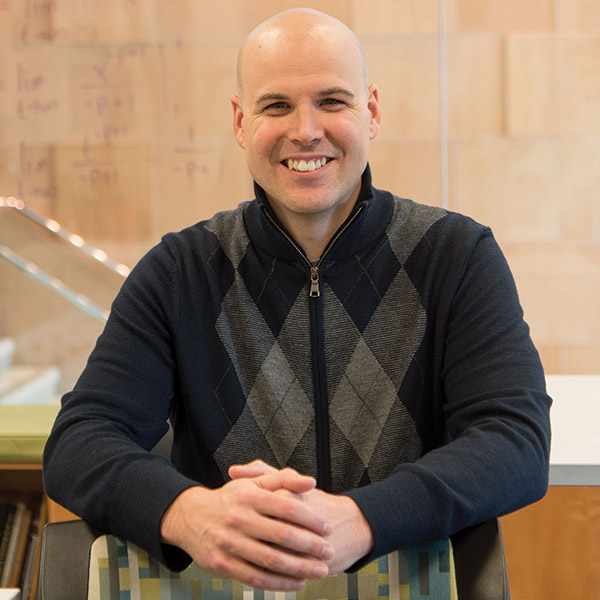LIFE OF THE MIND
Math Revolution
What if everyone changed the way they taught math? One Nazareth professor is at the forefront of a growing national movement.
by Yousuf George
What is mathematics? When I ask this question of students, typical responses mention right and wrong answers, numbers, and calculations. Memorizing and following seemingly arbitrary rules also feature prominently in student responses.
In contrast, when I ask the same question of fellow mathematicians, a typical response describes mathematics as the art of solving problems and communicating those solutions. Mathematicians also describe their subject as creative, collaborative, and beautiful.
This discrepancy is firmly rooted in the way we teach mathematics from kindergarten through college. A typical math lesson follows this routine: the teacher demonstrates a specific mathematical procedure and then assigns a multitude of exercises asking students to practice this exact procedure. Naturally, students conclude that mathematics is about memorizing and applying formulas rather than creating techniques with which to solve many problems. The creativity and beauty of mathematics is lost in today’s classrooms. Graduate school is often the first opportunity students get to actually experience mathematics in the same way as a professional mathematician. No one should have to wait so long.
If music were taught in a similar way, the teacher would write notes on the board, which students would diligently copy down. For a challenge, they might transpose those notes into a different key. Only in graduate school would students be trusted with an actual instrument. We would never accept this scenario in music, and neither should we accept it in mathematics. It is no wonder that mathematics seems like a dull and lifeless subject to so many students.
Mathematics is about problems, and problems must be made the focus of a student’s mathematical life. While it may be difficult and frustrating at times, students and their teachers should continuously be engaged in the process of solving problems: generating ideas, discovering patterns, making conjectures, constructing examples and counterexamples, devising arguments, and critiquing each other’s work. The standard mathematical methods and procedures emphasized today were invented to solve problems that our students have never even encountered. My call to educators is to have faith in the abilities of their students. Give students the problems first and allow them to create the solutions for themselves, just as mathematicians have done for centuries.
One example that I have used in my classroom seems simple enough at the outset: Suppose you have a large supply of books, all the same size, and you stack them at the edge of a table, with each book extending farther beyond the edge of the table than the one beneath it. Is it possible to stack the books in such a way that the top book extends entirely beyond the edge of the table? When students investigate this problem, they quickly find themselves working on the calculus of infinite series, in an accessible and often hilarious way.
I have used this problem-centered approach, often referred to as inquiry-based learning in the wider mathematical community, extensively in my classes at Nazareth. I have also worked directly with school-aged children, with teachers, and with other professors to try to bring authentic mathematical experiences, focused on problem solving, to as many people as possible. The classroom results were so evident, in terms of student engagement and growth, that all the faculty in our department are teaching via inquiry-based learning where possible. As a result, Nazareth has emerged as a leader in the growing movement toward inquiry-based learning in mathematics. A $2.5 million grant from the National Science Foundation will support several years of workshops, held at Nazareth for faculty from around the country, instructing attendees in inquiry-based learning.
We have seen firsthand at Nazareth that when students are exposed to inquiry-based learning in mathematics, their role shifts from memorizing and reproducing well-understood methods to generating their own ideas, their own connections, and their own understanding of a problem. In my experience, students are then empowered to engage in the art of problem-solving in precisely the way a research mathematician does. Mathematicians enjoy doing mathematics, and we should give all students the opportunity to share in that joy.
Yousuf George, Ph.D., is an associate professor of mathematics at Nazareth, co-director of the Upstate New York Inquiry-Based Learning Consortium, and co-founder of the Rochester Math Teachers’ Circle.
Update: Now also an associate dean of the College of Arts & Sciences at Nazareth, George in 2019 was honored with the Distinguished College Teaching of Mathematics in Recognition of Extraordinary Teaching award from the Mathematical Association of America's Seaway section (MAA).

Yousuf George, Ph.D.